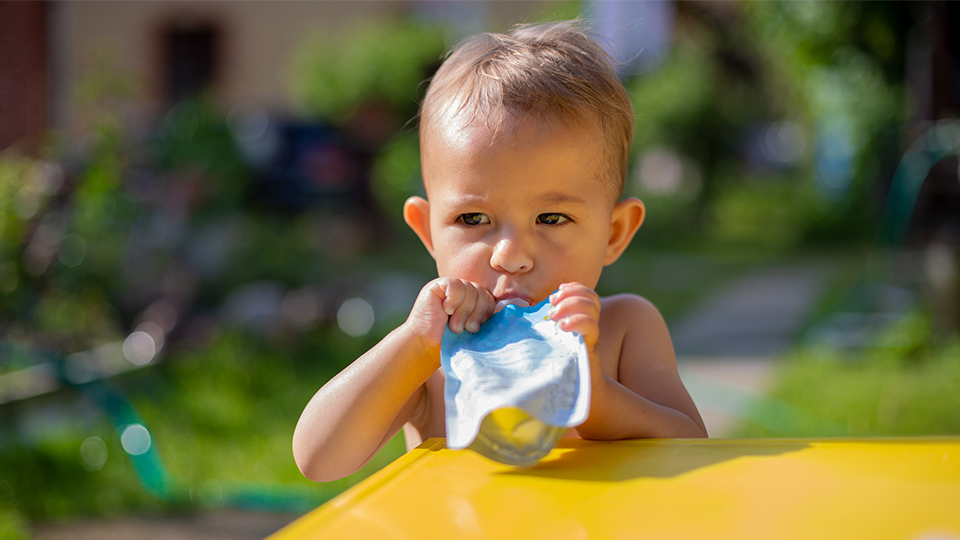The investigation’s findings, which have also been shared on the BBC website, may leave parents and caregivers questioning the best approach to feeding young children.
We spoke with Professor Emma Haycraft, an expert in psychology and public health whose research focuses on healthy development in children and adolescents, to get her response to the findings and advice on how families can ensure the nutritional needs of babies and toddlers are met.
What are your thoughts on the investigation’s findings?
“It’s easy to see how this has happened; brands often add fruits to their baby foods which make them more palatable (sweeter) to the babies or toddlers, but doing this adds natural fruit sugars which can soon add up, meaning babies and infants who are starting their journey onto solid foods can quickly end up consuming lots of sugar without parents even realising”, said Professor Haycraft.
“Similarly other ‘recipes’ are adapted by these brands meaning that key nutrients are being cut down or out.
“Commercial baby foods can be useful for feeding young children, but a downside is that the labels on the packets can mislead parents into thinking they are giving their child something they’re not.”
Do you think or government intervention is needed in the baby food industry?
“While the recent Panorama investigation has shone a light on the issues with companies misleading families about the nutritional and health benefits of their products, this issue is not new so government guidelines may be required if companies continue to mislead parents with food products that are lacking in nutrients to ensure that children who consume these foods are being well nourished”, said Professor Haycraft.
What key nutrients do babies and toddlers need, and are there any ingredients or foods that parents and guardians should avoid?
“Babies and toddlers need a varied diet”, explains Professor Haycraft, “The goal of initially introducing foods to babies (weaning) is about them exploring foods and learning how to eat and while they’re still consuming milk (breast or formula) they’re gaining essential nutrients from the milk.
“As children get older, and their milk intake decreases, it’s essential that they get all the nutrients they need from their foods.
“Babies and toddlers should be offered vegetables, fruit, starchy foods (like bread, toast, chapatti, pasta, potato), protein-rich foods (such as meat, fish (no bones), eggs (British Lion stamped), beans and pulses) and dairy foods (e.g., natural, unflavoured yoghurts that don’t have added sugars).
“Parents should try to avoid offering babies and toddlers food with added salt or sugar. This includes foods with lots of natural sugars, such as from fruit.
“Offering whole foods – such as carrots – that are cooked and either puréed, mashed, or served as batons (if age-appropriate) is preferable to using processed versions, as it allows parents to know exactly what their child is eating.”
What advice would you give to parents looking to replace baby food pouches with home-cooked alternatives?
“Offering a variety of foods is the way to go, and these can be foods that your family is eating but prepared so that your baby or toddler can consume them”, said Professor Haycraft.
“This might mean cooking foods to soften them and then either mashing them with a fork or blitzing the food so that it’s a suitable texture or offering foods as finger-foods. It might also mean adding salt, stock, or flavourings after taking out a portion for your child.
“For example, if you’re cooking potatoes for your family, these can be either puréed, mashed, or cut into sticks or wedges (if age appropriate) for young children, just ensure the potato skin is removed for very young children.
“Or if you’re cooking Spaghetti Bolognese, before adding salt or stock, set some aside for your child. This can be blended or cut into age-appropriate sizes and offered to your child.”
With food prices rising, what advice would you give to parents looking to feed their young children nutritiously on a budget?
“Commercial baby foods are very convenient, but they can be expensive. Offering children foods that the family is eating is a cost-effective way to introduce new foods to babies and toddlers”, said Professor Haycraft.
“Batch cooking foods for babies and toddlers – and the family! - can be very helpful. Young children (i.e. from when complementary feeding begins, around six months) are initially trying new tastes and flavours so don’t need much of each food as they’re also consuming breast/formula milk.
“Preparing and storing foods in ice cube trays can be handy as you can simply defrost a ‘cube’ of pureed or mashed food for your child to taste.”
To arrange an interview with Professor Emma Haycraft, email the Public Relations team or call 01509 222224.

